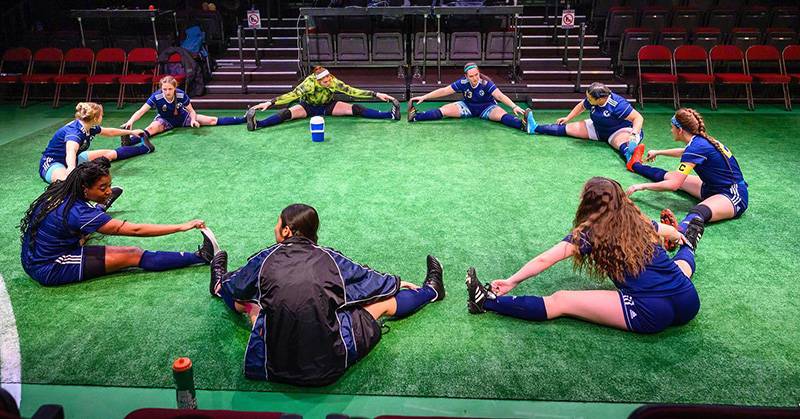When done well, a theatrical performance can take you on a journey into another time and place. It can bring you inside the hearts, minds, and struggles of others, even characters who seem at first glance to be the most different from you. At its best, theatre creates empathy and understanding. And when done exceptionally well, when it is both tangibly specific and widely universal, as The Wolves is, it yields laughter, breathlessness, and tears. It shakes you up, makes you dig deep, and maybe even see yourself, and your place in the world, in a new way. And in my particular case, I have not been able to shake these feelings since opening night.
My preview chat with director Nisi Sturgis only added to my excitement about the production. I am inherently prone to seek out, and to enjoy any art, visual, literary, or performance, that takes a complex approach to telling young women’s stories. In many ways I was not the target audience for this experience. Having been a non-athletic artsy, bookwormy loner who found her first team experience in theatre, and then later in bands, my high school experience could not have been more different than those depicted The Wolves. Or so I thought.
One of the best parts of attending a new production at the Studio Theatre is that first glimpse of how this simple black box space has been transformed into an entire universe, in this case an indoor soccer pitch, rendered perfectly by scenic designer Leon (Li) Ka, lighting designer Stephen Moderhock, costume designer Vivian Krishnan, sound designer Hayat Dominguez, and props master Haley Borodine. Practically blinded by the green glow of astroturf, I found a seat away from the interactive zone of the front row. Gradually, and with little to no fanfare, the team members emerged. Unpacking knapsacks, removing warm-up gear, hydrating and slowly drawing us in,
The world of soccer, its language, its movements, its props, grounds the narrative and provides an endless source of theatrical business to help establish character. The big game, the national championship, provides the goal (pardon the pun). And the fall out is real and its costs. Scholarships, as well as friendships, are at stake. But then soccer is the metaphor, not the ultimate point.
The Wolves finds its nine teammates, referred to largely by their numbers, in that awkward place between youth and adulthood, between innocence and experience. A time of great emotional uncertainty, significant, and often awkward, growth, raging hormones, and self-exploration. Over the course of six Saturday practices, the stakes get higher, and the deeper and more complex layers of characters emerge. If the sport provides The Wolves with its grounding foundation, the team provides the psychological scaffolding.
Playwright Sarah DeLappe’s bold, cacaphonous script, edited to harmonic perfection in both theme and sound by dramaturg Emily Goodell, illicits the rhythm of the game and the complexity of team dynamics. In the program notes Goodell shares her belief that the teammates are “equal parts family and platoon.”
As we see them circled together on the field, either huddled, or stretching each other (physically and emotionally), the intense cacophony of seemingly random dialogue overlaps spectacularly into surprising significiant and sublime tonal and thematic harmonics. In true coming-of-age style, the topic shifts around and back from Cambodia to Plan B to tampons vs. pads but at their core these are explorations of lost innocence/virginity and a growing awareness of our own fragility and mortality.
For me, one of the most compelling sounds, or emotional registers, was the outrage of a teenage girl who is first discovering the world’s evils. It brought me right back to my righteous teenage self and, it was good to connect with her again. She was fearless. I have been fortunuate enough to be both challenged and supported by various packs throughout my life and The Wolves reminded me of how transformative those experiences were.

Image: Photo of nine female soccer players stretching in a circle on the indoor field. Photo by Darell Hoemann.
Team functions as a dramatic vehicle for role-playing, for trying on new voices and identities, new vocabularies; for negotiating (and renegotiating alliances) within and without. The team functions as trust circle, safe space, and reflective mirror.
Ultimately, the team/pack, is ultimately a vehicle for the exploration of an emerging intersectional feminism. These Wolves have, after all, been left to fend for thermselves, all but abandoned by a series of absentee male coaches.
What begin as types (the diva/star player, the class clown, the know-it-all) quickly unfold into complex characters, who, as Goodell so apty observes, these characters lay their emotions on the battlefield of turf and sport. An extraordinary example of ensemble work, The Wolves, leaves me reluctant to single out any one player, or actor. They sparkle and shine the most in continually shifting combinations and alliances. They surprise us and each other.
While women both young and old, soccer moms and players, may feel most drawn to The Wolves, its rivetting performances and rich dialogue remind us that we are all players in one game or another. And evening enjoyed with this production is sure to leave you contemplating your position, your wins, and your losses. You will likely also be inspired both by the artistry of the performers, creative and technical crew members and by the passion and power of young people as they face the realities of adulthood.
The Wolves
Krannert Center for the Performing Arts
500 S Goodwin Ave
Urbana
February 13th through 23rd
Get showtimes and ticket information here.








